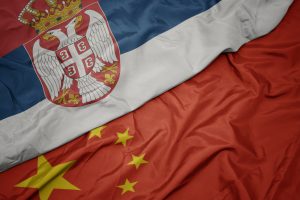In October, the Serbian Parliament adopted an 850-page bilateral trade agreement with China. Drowned out by other global events – foremost the breakout of violent conflict in Israel and Palestine – the deal was barely noticed by European media.
Signed on the eve of the country’s upcoming elections, Serbian leaders promoted the deal as a major opportunity for economic growth, while the defense aspects were minimized or not mentioned at all.
Yet buried within the agreement’s mountain of statutes are developments that warrant serious attention. The negotiations covered a variety of products, including weapons, copper, and agricultural goods, that Serbia has agreed to import from China and vice-versa. Custom tariffs on these products will decrease each year for the following 15 years.
Most alarming are the armament portions of the deal. Serbia will benefit from a growing discount every year if it buys Chinese missiles, bombs, torpedoes, tanks, and other defense-related products listed in the agreement. Customs tariffs for these Chinese manufactured weapons will fall from a 25 percent custom tariff to 2.5 percent at the end of the 15-year period, according to the agreement.
Serbia first announced plans to buy arms from China in 2019. Since then, the EU candidate country has received deliveries of battle drones and the air defense system FK-3 , as well as large medical donations from Chinese defense companies during the COVID-19 pandemic. For its part, Serbia has allowed special Chinese security forces to drill in the town of Smederevo, an hour’s drive from Belgrade.
The free trade agreement is likely to lock Serbia into a more involved, long-term strategic relationship with China, while further distancing the Balkan nation from the rest of Europe. All Chinese defense companies have direct links to the Chinese Communist Party and to the party’s military wing, the People’s Liberation Army (PLA).
Some of the Chinese firms operating in Serbia are sanctioned by the United States and other Western countries. For example, the Poly Group Corporation, which is in discussions to establish a joint venture agreement with Serbia to develop night vision missile systems and anti-terror equipment, has been accused of delivering arms to Iran, North Korea, and Syria.
Chinese civilian companies with ties to the PLA may also find greater opportunities to expand their presence in Serbia. One such firm, the China Machinery Engineering Corporation (CMEC), made a deal with Serbia last year to handle the wastewater in Belgrade. CMEC is involved in arms trades with regimes and entities in conflict areas or countries in war and has been sanctioned by the United States.
The new trade agreement may also be harmful to Serbia’s domestic economy. As Chinese competitors flood into the country’s market, many small and medium-size Serbian enterprises may fail to keep up and be forced to close. China is already Serbia’s single largest contributor of foreign direct investment, pumping $737 million into the country in 2021.
Serbia’s deepening links with China have been criticized by both the United States and the EU. A resolution from the European Parliament warned that Serbia’s warming relationship with China “raises questions about the country’s strategic direction” and hinders the country’s “economic and political development.”
The president of the European Commission, Ursula von der Leyen, applied a touch of soft diplomacy when she recently commented on the new trade agreement: “We want Serbia to join the EU. Being a part of the union is a unique opportunity that no one else can match. Serbia should take the next steps to get closer to us, including in foreign policy.”
But so far, Belgrade has shown no signs of taking a more cautious approach toward China. Instead, Serbia’s long-volatile flirtation with China is smoothing into a long-term marriage.
European lawmakers must recognize that dangling the promise of EU membership has proven ineffective in curtailing Serbia’s growing ties with China. The same goes for EU attempts to put more diplomatic and economic pressure on the country. For years, Serbia’s ruling elite have changed legislation in order to facilitate greater capital flows from China, even as Chinese investors have repeatedly flouted demands for greater transparency. In addition to representing a clear security threat, Chinese investments in Serbia have wreaked devastating impacts on the country’s climate, environment, and human rights.
It is time for Serbia’s neighbors and EU member countries to act, before Europe is exposed to even more harm from China’s investments into new coal power and other polluting industries. A more efficient strategy than simply applying diplomatic pressure on Serbia would be to introduce and promote much-needed European investments into the country. It is time to include the Western Balkans in the EU’s single market and provide the region with more sustainable, long-term economic opportunities.
Otherwise, China will.

































